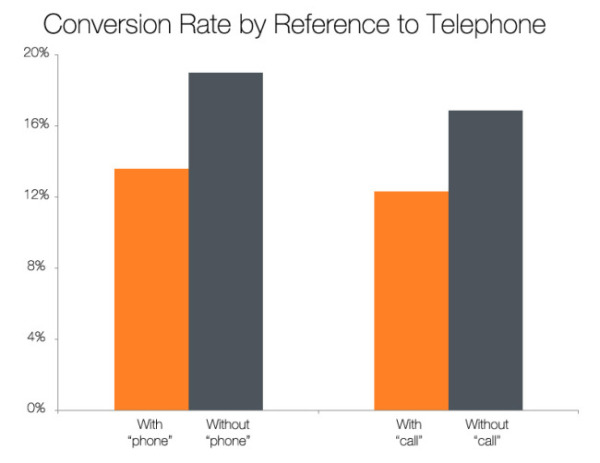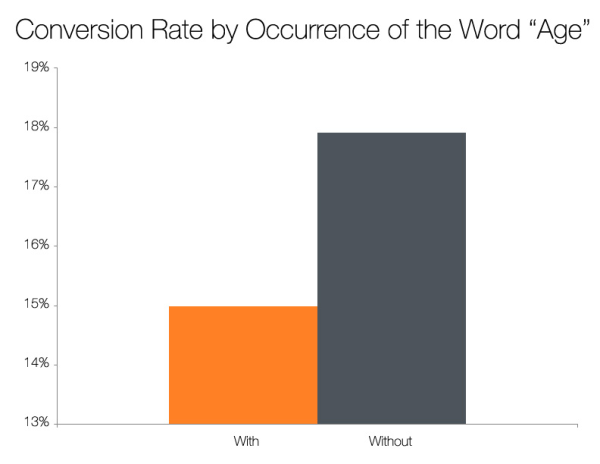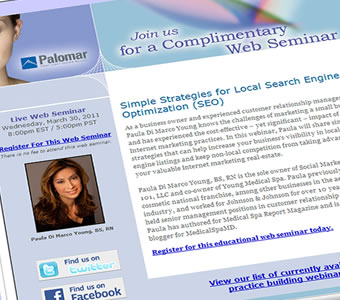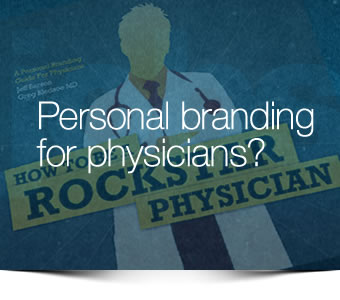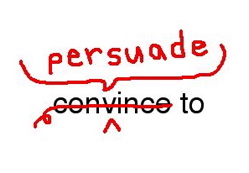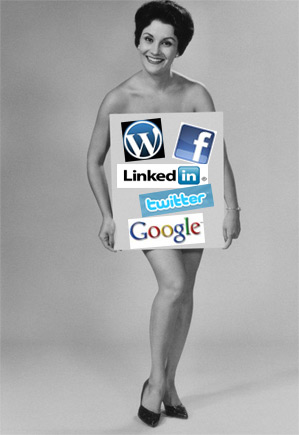Are Groupon Deals Killing Your Medical Spa?
/There's a deluge of Groupon offers from Medical Spas who are using cheap laser hair removal treatments to gain new patients... Is it working?
This Groupon tactic is used by skin clinics who are desperately trying to get new clients and don't know how to market effectively or drive perceived value.
Let's take a look at some of these offers and run some numbers on how effective, or ineffective, this will be for your medical spa or laser clinic.
Here's the first of the offers for laser hair removal that I've received from a local laser clinic in the last two weeks. (I think I've received five or six.)
This Groupon offer is from Enlighten Laser Cosmetics of Bountiful, UT.
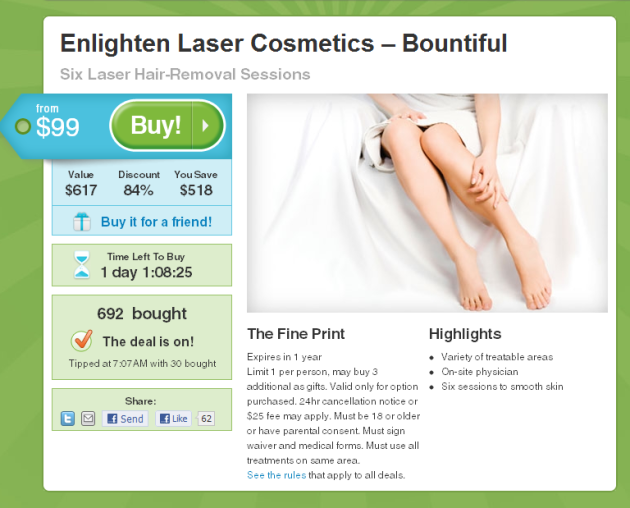
Okay, so let's take a look. Enlighten is offering an 84% discount on laser hair removal from a starting price of $617 for a savings of $518.
The starting price seems about right for what the average cost of most 6 series laser hair removal treatments are in the area so that appears about right. Since they've sold 700 treatments the can't be unhappy about that since it appears that they're getting swarmed with new clients. Let's dig a little deeper.
The selling price is $99. Groupon takes 50% so Enlighten is taking $49.50 for each sale. They may have sold many more than 700 but let's go with that number. So, with 700 sales at $49.50, Enlighten is bringing in a respectable $34,650 from Groupon...
So let's break down that number and see what we find.
With 700 sales at an average of 6 treatments we see that that gross number of $34,650 comes in at a mere $8.25 per treatment. ($34,650 / 700 = $99 / 6 treatments = $8.25 per treatment)
Not so good.
That's $8.25 before any labor, rent, treatment tips, appointment scheduling or anything else. It also ties up around 4,000 or treatment room time that this laser clinic won't be able to use for other treatments. They'll also have to deal with all of the support issues; phone calls, appointment setting, consultations, equipment depreciation and the inevitable complaints and patient issues that arise any time you're treating a patient population of 700 individuals.
If you've ever sold gift certificates you know what I mean. You sell a boat-load in December for the holidays and then starve in January and February as your rooms are booked delivering the services and no money's coming in.
So, what is the most likely scenario?
Enlighten laser clinic is going to skimp on treatment time.
Instead of performing a complete treatment, the staff is going to be under a lot of pressure to get these patients in and out. One likely scenario? They'll cut a 45 minute treatment to 30minutes. They'll perform skip treatments where they're not covering the entire area but treating every other one. They'll have a waiting room stacked six high or schedule patients only on off hours... All of these can lead to exactly the opposite result that Enlighten is looking for, happy repeat clients.
I'll also note that as I've spoken at length about before, the people buying these Groupon deals are coming for price, and they'll leave it just as quickly... Not the patients you're looking for.
Here's another laser hair removal offer from Lisse Laser & Aesthetics Medical Spa in SLC, UT.
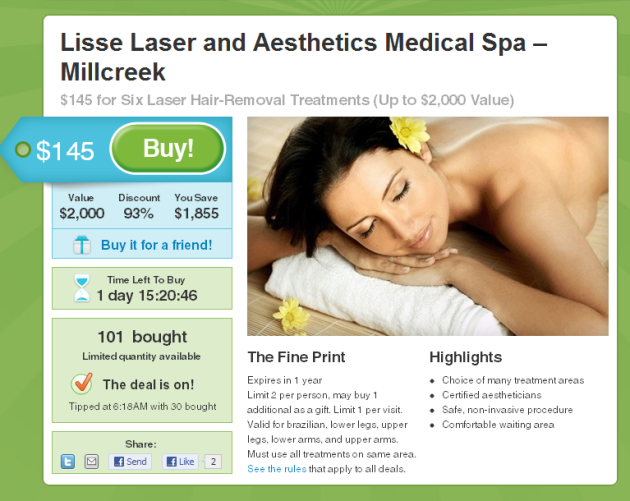
This offer arrived in my inbox early this morning so it just started. They have 101 sold deals now but it doesn't end for 24 hours so they'll probably sell many more. (Note: While I wrote this post their sales have climbed to 371 in about 40 minutes.)
Lisse Laser & Aesthetics Medical Spa is taking a much sneakier approach. They're listing their value at $2000 in value.
Here's Lisse's Groupon offer:
...for $145, you get six laser hair-removal treatments on the lower or upper legs (a $1,000 value for women, $1,400 value for men), lower or upper arms (a $700 value), or Brazilian bikini area (a $1,000 value for women, $2,000 value for men)
So again, six treatments but at least they're making an extra $23 per patient. Let's do the math again.
$145 per sale / 6 treatments = $24.16 per treatment.
Lisse is going to have all of the same issues and problems with scheduling, service, appointment setting and the rest as well.
(I'd be interested to hear how those medspas that are using commission (which I personally hate) to pay their staff feel that this kind of discount effects both the level of service and the commission structure. If you have a thought on this please comment.)
And there's another problem.
Selling your services at this type of discount positions you in the marketplace as the cheap player in town. You'll never be able to control your pricing. You'll never be able to create steady, repeat buyers that pay a premium for your services. You'll never be able to bring in the bigger treatments and you'll always have cash flow issues.
Instead, you'll always be scraping along at the bottom of the barrel... if you can survive this type of cut throat slash-and-burn price war.
I can see that Groupon is doing a great job of selling their deal to laser clinics just by the endless stream of deals.
For Groupon this is great. They just made $34,650 from Enlighten by sending out an email... but Enlighten is the one who's stuck delivering all of the services, making all of the appointments, dealing with the customers, and putting their reputation and business on the line, including the potential of any issues that hit their malpractice insurance or medical licensure. (I'm not saying this will happen, just that the risk is entirely on Enlighten and the physician, not Groupon.)
Undoubtedly, there are some occasional successes and I've heard from clinics that claim that they love Groupon, but I've never heard from a physician who was paying the bills that this worked well. It's often the staff that like this since the clinic is now busy, but the physician owner is the one that's not making any money and still paying out.
Here's a quote from a business that ran a Groupon offer.
After three months of Groupons coming through the door, I started to see the results really hurting us financially. There came a time when we literally could not make payroll because at that point in time we had lost nearly $8,000 with our Groupon campaign. We literally had to take $8,000 out of our personal savings to cover payroll and rent that month. It was sickening, especially after our sales had been rising. So the experience jaded me, and the interactions with the few bad Groupon customers we had jaded our staff. After all of this, I find myself not even willing to buy Groupons because I know how it could hurt a business...
This business owner goes on to tell of her experience that the Groupon clients also lambasted her business on Yelp and other review sites with negative reviews.
If you have an opinion on this or experience with Groupon, please leave a comment.
Additional posts on Groupon:


